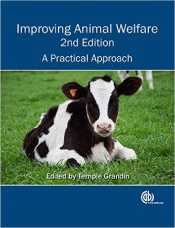 |
Improving Animal Welfare: A Practical Approach (2nd Edition)
Edited by Dr. Temple Grandin
Colorado State University, USA
ISBN: 978-1-78064-467-7
c. 368 pages
131 figures/illustrations
Subject Classifcation: KNAC, PSVP, TVH, TW
Territorial Market Rights: World
Published by CABI
Links for ordering:
- Amazon.Com
- CABI.org
|
Chapter 3: Why is agricultural animal welfare important? The social and ethical context.
by Bernard Rollin, Colorado State University
This chapter covers problems with the loss of animal husbandry skills on large intensive farms. He also discusses the concept of what is "sound science." Is it science used to improve productivity or science that is used to show that conditions need to be changed to improve animal well being? This chapter may change what your concept of sound science is.
Below is an excerpt from Chapter 3...
- Production diseases — by definition a production disease is a disease that would not exist or would not be of serious epidemic import were it not for the method of production. Examples are liver and rumenal abscesses resulting from feeding cattle too much grain, rather that roughage. The animals that get sick are more than balanced Out economically by the remaining animals’ weight gain. Other examples are confinement-induced environmental mastitis in dairy cattle, weakness caused by beta-agonists to increase muscle mass in pigs and ‘shipping fever’ in beef cattle. There are textbooks of production diseases, and one of my veterinarian colleagues calls such disease ‘the shame of veterinary medicine’ because veterinary medicine should be working to eliminate such pathogenic conditions, rather than treating the symptoms.
- Loss of workers who are ‘animal smart’ — in large industrial operations such as swine factories, the workers are minimum-wage, sometimes illegal, often migratory workers with little animal knowledge. Confinement agriculturalists will boast that ‘the intelligence is in the system’ and thus the historically collective wisdom of husbandry is lost, as is the concept of the historical shepherd, now transmuted into rote, cheap, labour.
- Lack of individual attention — under husbandry systems, each animal is valuable. In intensive swine operations, as illustrated earlier in the anecdotes illustrating industry versus husbandry, the individuals are worth little. When this is coupled with the fact that workers are no longer caretakers, the result is obvious.
- The lack of attention to animal needs determined by their physiological and psychological natures — as mentioned earlier, ‘technological sanders’ allow us to keep animals under conditions that violate their natures, thus severing productivity from assured well-being.
 Click here to return to the Homepage for more information on animal behavior, welfare, and care.
Click here to return to the Homepage for more information on animal behavior, welfare, and care.
 Click here to return to Dr. Grandin's Books and Video page.
Click here to return to Dr. Grandin's Books and Video page.
 Click here to return to the Improving Animal Welfare Table of Contents page and read other chapter excerpts.
Click here to return to the Improving Animal Welfare Table of Contents page and read other chapter excerpts.


 Click here to return to the Homepage for more information on animal behavior, welfare, and care.
Click here to return to the Homepage for more information on animal behavior, welfare, and care.